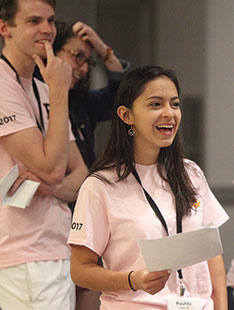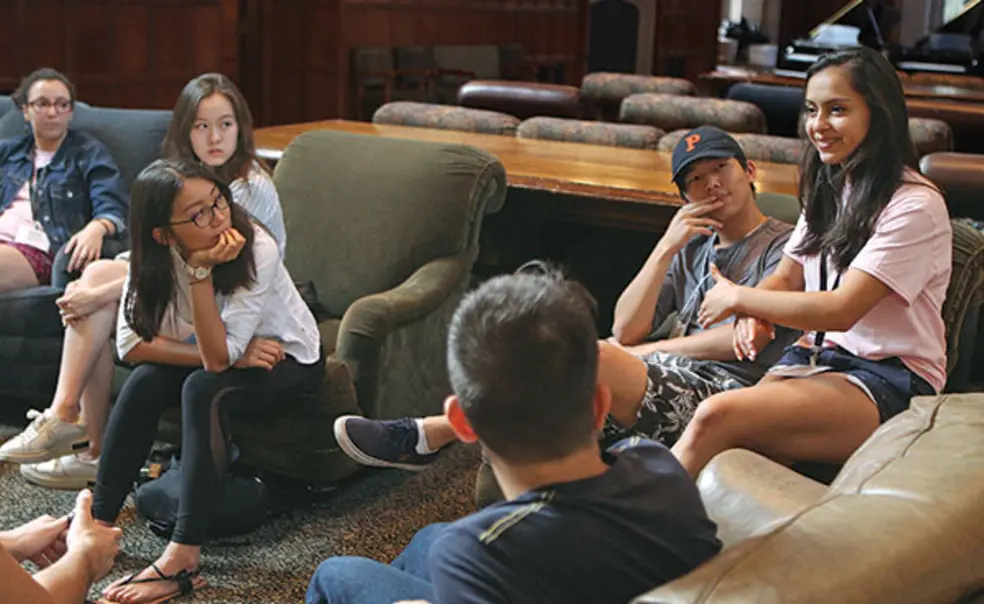A Day With ... Paulita Mejia ’18
Cheesy skits, shopping, and advice for 176 international arrivals
This is another installment of a new feature about a day in the life of a Princetonian.
Paulita Mejia ’18 coordinates the International Center leaders at the Davis Center. Born in Ecuador, Mejia lived in Indiana for most of her life and has participated in International Orientation (IO) since arriving at Princeton. She worked closely with the Davis Center and led 23 international student leaders to welcome 176 international students this year. We caught up with Mejia on the second day of orientation, and she told us what it’s like.
Forbes roundtable The way I like to describe IO is like a sprint marathon, because we work from very early till very late. Getting up was quite a struggle, but you’re also really excited to keep going. The first thing that I went to was a breakfast and residential-college roundtable; I was in Forbes, so I went to the Forbes [College] roundtable. The deans talk about Forbes and they ask us what our experience at Forbes was like, so I always talk about the community. A lot of people throw a lot of shade at Forbes, so I like to pipe up and put in a few good words.
America 101 The students have their immigration sessions, and right after that is “America 101”: skits essentially about adjusting to American culture. One of them is greetings and handshakes, so somebody from France is trying to give an American two kisses on the cheek and the American is like, “Whoa, I don’t feel the same way about you.” So it’s a cheesy way to show how a typical Princeton/American adjustment would be for international students. My part throughout all of that is the narrator of all the skits. Everybody thought it was hilarious.
Shopping After that we go to the Nassau Park shopping center [with Target, Walmart, and 47 other stores]. This is a good time for the freshmen to get anything that they may have not been able to bring to the States — bedding, some people buy fridges, hangers, all the basics. The leaders have to hustle to buy all the supplies we need for icebreakers. It’s tradition for the leaders to get lunch at Penang, a Thai restaurant. I got the pad thai, although traditionally the leaders love getting the volcano pork chops because they come on fire.

Dinner on the Street We try to introduce the students to a lot of different aspects of Princeton, so this is their introduction to an eating club. Every time they walk into Quad they’re like, “Oh wow!” They’re very wide-eyed, bushy-tailed. They give me more energy and excitement about Princeton each year. I didn’t have a lot of time to eat — people are always telling me, “You need to do this with me right now.” But I grabbed corn, salad, and some of the steak, and then I took some cheesecake to go.
Icebreakers I’m the emcee for icebreakers. I’m pretty short, so I stand on a chair so they can see me. We played seven games, and it gets very intense. In one of the games you have to pass an orange around the circle using only your neck, so it looks like people might be making out — but that’s not what they’re doing at all. And it’s extra ridiculous because everybody is really competitive. At this point, everybody is really close with their groups, and if they’re not before this, then they definitely are after this. All of these things sound really silly, but I remember as a freshman, it was the biggest deal. You definitely get caught up in the moment: Everyone goes wild. We play “Eye of the Tiger,” and it’s for all the glory.
International at Princeton My freshman year there were something like 160 international students and at the welcoming dinner the coordinator did a roll call of nations, and I think 97 countries were represented. I was the only person from Ecuador there, and it’s so cool when there are people there who are actually representing a country. We have a student from Venezuela this year; we have a student from Syria. There’s all these things that happen that you read about in the news and you learn about in classes, and there are real live people who are experts on this because they lived through it.
Edited and condensed by Anna Mazarakis ’16












1 Response
Lance Johnson
8 Years AgoExcellent Insight
Excellent insight because simply being an international student away from home is difficult, compounded by our complex culture and language. Welcoming and assimilation assistance must come from numerous sources to aid these young people embarking on life’s journey. Most struggle in their efforts and need guidance from schools’ international departments, immigration protection, host families, concerned neighbors and fellow students, and even informative books to extend a cultural helping hand so we all have a win-win situation.
Something that might help anyone coming to the U.S. is the award-winning worldwide book/ebook "What Foreigners Need To Know About America From A To Z: How to Understand Crazy American Culture, People, Government, Business, Language and More.” Used in foreign Fulbright student programs and endorsed worldwide by ambassadors, educators, and editors, it identifies how “foreigners” have become successful in the U.S., including students.
A chapter on education explains how to cope with a confusing new culture and friendship process, and daunting classroom differences. It explains how U.S. businesses operate and how to get a job (which differs from most countries), a must for those who want to work with/for an American firm here or overseas.
It also identifies the most common English grammar and speech problems foreigners have and tips for easily overcoming them, the number one stumbling block they say they have to succeeding here.
Good luck to all wherever you study or wherever you come from, because that is the true spirit of the American people, not a few in government who shout the loudest!